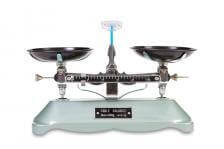Are Mass and Weight the Same Thing?
Is your mass the same as your weight? If not, what’s the relationship between these two ideas? And why do so many people get them confused? Keep on reading to find out!
Jason Marshall, PhD
Listen
Are Mass and Weight the Same Thing?

In truth, the differences between the precise mathematical meanings and the everyday colloqiual uses of such words don’t have a huge impact on your day-to-day life. But even so, they are nonetheless interesting things to talk about. In fact, some of the squiggly little nuances that pop-up in those discussions turn out to be extremely interesting!
Which is exactly why we’re about to embrace our intrepid spirit of curiousity and ponder just such a topic. Specifically, today we’re going to talk about weight and mass. Are they the same thing? If so, why do we have two words for one idea? If not, how are they different? And why are people always getting them mixed up?
;
What Is Mass?
Is your weight the same as your mass? In short (spoiler alert), no.
To see why this is, let’s take a step back and think about what it is that we’re trying to figure out when we “weigh” something. For example, why does the person at the farmers’ market weigh your bag of peaches before charging you? Obviously, they want to figure how much peach-stuff you have in your bag. I don’t mean the number of peaches you have (because peaches can be big or small), I mean the overall amount of peach matter you’ve bagged up.
Mass is a measure of how much stuff something contains.
This amount of matter is what we call the “mass” of the peaches—it’s equal to the combined mass of all their atoms, and is measured in units of grams or kilograms.
As long as you don’t take a bite out of any of your peaches (or do anything else to them to alter how much matter they contain), their mass will not change. Putting them in your car won’t change their mass, singing to them won’t change their mass, even moving them to another planet won’t change their mass.
Why? Because mass is a property of something—it’s a measure of how much stuff it contains. And that doesn’t spontaneously change.
What Is Weight?
While moving your peaches to another planet won’t change their mass, it turns out it will change their weight. And that’s because the weight of an object is a measure of how hard gravity is pulling on it. When you stand on a scale on Earth, you feel your feet pushing down on the scale and you see the scale respond to that pressure. But why are your feet pushing down on the scale?

Technically speaking, the weight of an object is equal to its mass times the acceleration of gravity (on whatever planet you happen to be on.) So the more mass something has, the higher its weight, and the stronger the force of gravity it feels. Scientists measure weight using a unit called Newtons, although the commonly used unit of pounds is also a perfectly proper unit of weight (grams and kilograms are not—they measure mass).
What would happen if you were to strap a scale to your feet and jump out of an airplane—would the scale show the same weight as it did on the ground? No, since gravity would be pulling both you and the scale to the ground, your feet would no longer push on it as it did on the ground and your apparent weight would be different. Of course, your mass wouldn’t be changed by this experience—you would, after all, still be the same person.
How Much Do You Weigh?
Instead of jumping out of an airplane with your scale, what if you took your scale to another planet? Well, besides being the only person on that planet with a scale, what would happen to your weight? As you probably know, the masses of the various planets are very different (because they contain different amounts of stuff), which means that the pull of gravity on each is also very different.
A 170 pound person would weigh only about 1/10 pound on Phobos!
Why does that matter? As we saw earlier, your weight is equal to your mass times the acceleration of gravity of wherever you are.
On Earth, the acceleration of gravity is equal to about 9.8 m/s2. On the Moon (which has much lower mass than Earth), the acceleration of gravity is only about 1.6 m/s2. That means you’d weight about 6 times less on the Moon! On Mars’ moon Phobos, the acceleration of gravity is 1,690 times smaller than it is on Earth. That means a 170 pound person would weigh only about 1/10 pound on Phobos!
Although your weight could be dramatically different depending on where you are, your mass is the same everywhere. After all, whether you’re on Earth, the Moon, Mars’ moon Phobos, or anywhere else, you—and all of the atoms you are made of—are you.
Of course, being tethered to Earth, we don’t get to weigh ourselves on alien planets very often. As such, in our daily lives, we never have to worry about the distinction between mass and weight—so we don’t! Which is precisely why people tend to say “weight” when they really mean “mass”–and the other way around.
Wrap Up
OK, that’s all the math we have time for today.
Please be sure to check out my book, The Math Dude’s Quick and Dirty Guide to Algebra. And remember to become a fan of The Math Dude on Facebook, where you’ll find lots of great math posted throughout the week. If you’re on Twitter, please follow me there, too.
Until next time, this is Jason Marshall with The Math Dude’s Quick and Dirty Tips to Make Math Easier. Thanks for reading, math fans!
Balance scale and feet on scale images courtesy of Shutterstock.

